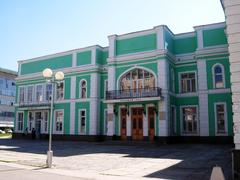Chishma Visiting Hours, Tickets, and Historical Sites Guide
Date: 04/07/2025
Introduction
Nestled in the scenic foothills of the southern Urals in the Republic of Bashkortostan, Russia, Chishma is a rural village celebrated for its rich Bashkir heritage, enduring traditions, and welcoming spirit. The village’s name—meaning “spring” or “fountain” in Bashkir and Tatar—aptly reflects its origins and the natural beauty that defines the area. As a living testament to centuries of multiethnic influences, Chishma offers visitors a rare glimpse into the authentic rhythms of rural Bashkortostan, blending history, culture, and natural allure (Visit Bashkortostan).
This comprehensive guide equips travelers with essential information on Chishma’s historical context, visitor logistics, local monuments and museums, ticketing policies, practical travel tips, and cultural highlights. Whether you are drawn by its vibrant festivals, tranquil landscapes, or the fascination of Bashkir history, Chishma stands as a rewarding destination for cultural tourism and heritage exploration (Penguin Travel; Lonely Planet).
Chishma: Historical and Cultural Overview
Origins and Settlement
Chishma is situated within the Balyklykulsky Selsoviet of the Aurgazinsky District, about 12 kilometers from Tolbazy (the administrative center) and 3 kilometers from Balyklykul. The region has been inhabited since ancient times by Bashkirs, Tatars, and Russians, whose interactions have shaped the area’s distinctive multiethnic character.
Demographics and Community Life
With a population of just 65 as of 2010, Chishma maintains a close-knit rural community. Residents uphold traditions in language, cuisine, and Islamic religious practices. Visitors are often welcomed into homes, where they can experience Bashkir hospitality, sample local food, and take part in everyday village customs (russianconsulate.org).
Bashkir Heritage and Ethnogenesis
The Bashkirs are among Russia’s oldest Turkic ethnic groups, with a documented presence in the region since at least the 10th century (Eurasia Assembly). The Bashkir language, from the Kipchak branch of Turkic languages, is spoken by about a quarter of the republic’s population, though Russian serves as the lingua franca (Wikipedia: Bashkortostan). The region’s rich folklore and the enduring symbolism of the wolf are reflected in the very name “Bashkortostan.”
Cultural Practices, Festivals, and Rituals
Traditional festivals are at the heart of Chishma’s communal life. Sabantuy and Navruz are especially significant, featuring music, dance, athletic competitions, and communal feasts. During Navruz, rituals such as house cleaning, bonfire jumping, and communal cooking of sumalak (a wheat pudding) reinforce community bonds (tatarstan.eu). Music, performed on the quray (flute) and dombra (stringed instrument), and folk dances such as yiyin beyue, are central to these celebrations.
Cuisine and Hospitality
Bashkir cuisine reflects a blend of agricultural and pastoral traditions, with dishes such as bishbarmak, chak-chak, and dairy-based specialties. Hospitality is paramount; guests are treated to home-cooked meals and offered tea with jam or honey, especially during festivals.
Religious and Spiritual Life
Sunni Islam is the predominant religion, shaping many aspects of village life and ceremonies. Some syncretic practices—blending Islamic and pre-Islamic customs—persist, especially during local festivals (insidethenewrussia.com).
Key Historical Sites and Cultural Institutions
Chishma Monument
The Chishma monument is a symbol of local heritage, featuring traditional Bashkir architectural motifs. Open daily from 9:00 AM to 6:00 PM (extended hours during festivals), the monument is free to visit, though voluntary donations support its upkeep. Special events and guided tours are organized during regional festivals; booking in advance is recommended.
Eurasian Museum of Nomadic Civilizations
Located in the Chishminsky District, this museum offers a deep dive into the nomadic roots and ethnogenesis of the Bashkir people (Eurasia Assembly).
- Hours: Tuesday–Sunday, 10:00 AM–6:00 PM; closed Mondays
- Tickets: Adults 300 RUB, students/seniors 150 RUB, children under 7 free
- Guided Tours: Daily at 11:00 AM and 3:00 PM (advance booking recommended)
- Accessibility: Wheelchair accessible with assistance on request
Exhibits include reproductions of Ahmad ibn Fadlan’s 10th-century manuscript, Mahmud Kashgari’s 11th-century map, and genealogical records of Bashkir tribal leaders.
Ufa’s Museums and Landmarks
- National Museum of Bashkortostan: Open Tuesday–Sunday, 10:00 AM–6:00 PM; entrance ~150 RUB
- Bashkortostan Art Museum: Tuesday–Sunday, 10:00 AM–5:00 PM; tickets ~100 RUB
- Lyalya-Tulpan Mosque: Daily, 8:00 AM–7:00 PM; free entry, guided tours by request
- Salavat Yulaev Monument: Open-air, accessible year-round
Nature and Outdoor Activities
Bashkir State Nature Reserve
- Hours: 9:00 AM–7:00 PM (summer); reduced in winter
- Tickets: ~200 RUB; guided tours available
- Accessibility: Some areas may be challenging; sturdy footwear recommended
Explore mixed forests, meadows, and steppe landscapes, with hiking, wildlife observation, and birdwatching opportunities.
Visitor Information and Practical Tips
How to Get There
- By Car: From Ufa or Birsk, drive via regional highways to Tolbazy, then follow local roads to Chishma
- Public Transport: Limited bus and marshrutka services from Ufa or Birsk; pre-arranged taxis or car rentals recommended for flexibility
Accommodation
Chishma offers basic guesthouses and homestays; booking in advance is essential, especially during festival seasons. Birsk and Ufa provide a wider range of hotels.
Entry and Visas
Visitors must comply with Russian visa regulations. E-visas are available for many nationalities, allowing stays up to 16 days (Penguin Travel). Registration with local authorities is required within 7 days of arrival (Lonely Planet).
Money and Payments
The Russian ruble is the only accepted currency. ATMs are available in Birsk and Ufa; cash is essential in rural areas as cards may not be widely accepted (We Will Nomad). Some foreign cards may not work due to sanctions—bring multiple payment options.
Health and Safety
Chishma is generally safe. Take standard precautions, especially at night. Medical facilities are basic—carry necessary medications and comprehensive travel insurance. Drink bottled or filtered water (Penguin Travel).
Communication
Russian is widely spoken; Bashkir is also common. English is rare outside major centers—translation apps are helpful (Against the Compass). Learning basic Russian or Bashkir phrases is appreciated.
Cultural Etiquette
Dress modestly, especially at religious sites. Women should cover their heads in Orthodox churches; men should remove hats (Lonely Planet). Always ask permission before photographing locals, and bring small gifts when visiting homes.
Frequently Asked Questions (FAQ)
Q: What are Chishma’s visiting hours and ticket policies?
A: The village and monument are open daily, typically 9:00 AM–6:00 PM; museums have individual hours and ticket fees.
Q: How do I get to Chishma from Ufa?
A: By car (recommended), regional bus, or pre-arranged taxi.
Q: Are there guided tours?
A: Yes, local guesthouses and museums offer guided tours; book in advance.
Q: What festivals can I attend?
A: Sabantuy (early summer) and Navruz (spring equinox), featuring music, dance, and traditional games.
Q: Is the area accessible for travelers with disabilities?
A: Some attractions are accessible; contact local offices for up-to-date information.
Visuals and Interactive Elements
- High-resolution images of Chishma’s wooden houses, Eurasian Museum of Nomadic Civilizations, and local festivals
- Interactive map showing Chishma, Ufa, and Birsk with key attractions
- Photos of Navruz and Sabantuy celebrations
Conclusion and Recommendations
Chishma, Bashkortostan, is an exceptional destination for travelers seeking authentic rural experiences, rich cultural traditions, and meaningful encounters with Bashkir heritage. With its open village charm, accessible historical sites, and vibrant festival calendar, Chishma invites exploration and community engagement. To maximize your visit, plan ahead using official resources and travel apps, respect local customs, and embrace the hospitality of this remarkable region.
For the latest travel updates and cultural guides, download the Audiala app and follow our social media channels. Prepare for an enriching journey to one of Bashkortostan’s most cherished rural gems.
Official Links and References
- Visit Bashkortostan
- Eurasia Assembly
- Penguin Travel
- Lonely Planet
- Wikipedia: Bashkortostan
- Russian Consulate: Rural Life Experience
- DB-City Chishma Weather
- We Will Nomad
- Against the Compass
- Express to Russia
- The Invisible Tourist


